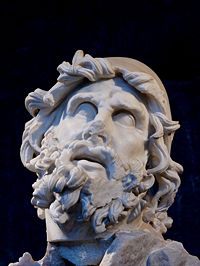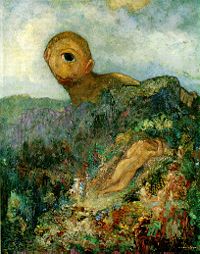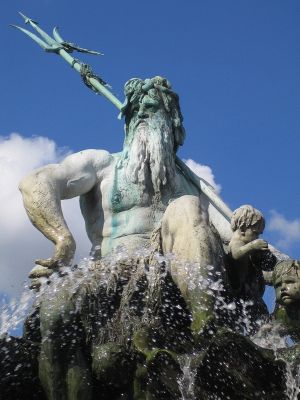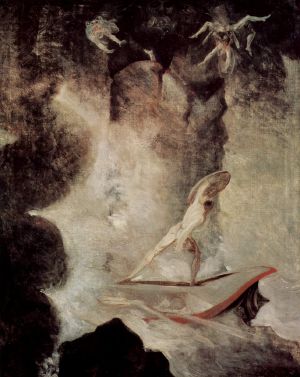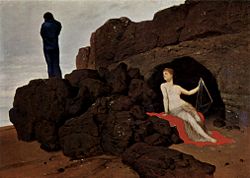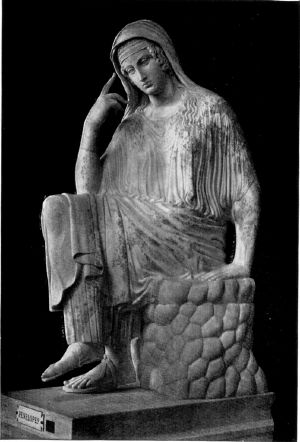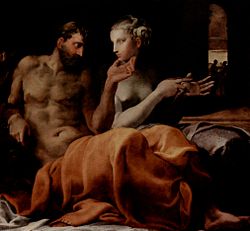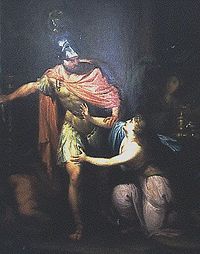Odysseus
Odysseus or Ulysses (Greek ߯ł╬┤¤ů¤â¤â╬Á¤Ź¤é Odysseus; Latin: Ulixes), was the mythical Greek king of Ithaca and the main hero in Homer's epic poem, the Odyssey. Odysseus also plays a key role in Homer's Iliad. King of Ithaca, husband of Penelope, father of Telemachus, and son of La├źrtes and Anticlea, Odysseus is renowned for his guile and resourcefulness (known by the epithet Odysseus the Cunning, and said to be third to only Zeus and Athena in wisdom; and is most famous for the ten eventful years it took him to return home after the Trojan War.
Relatively little is known of Odysseus' background except that his paternal grandfather (or step-grandfather) is Arcesius, son of Cephalus and grandson of Aeolus, while his maternal grandfather is Autolycus, son of Hermes and Chione. According to some late sources, most of them purely genealogical, Odysseus had many children, including, with Penelope, Telemachus and Poliporthes (born after Odysseus' return from Troy). With Circe, he fathered Telegonus, Ardeas, and Latinus. With Calypso, there was Nausinous and with Callidice, came Polypoetes.
Most such genealogies aim to link Odysseus with the foundation of many Italic cities of remote antiquity. Ithaca, an island along the Ionian coastline of Greece, is one of several islands that would have comprised the realm of Odysseus' family, but the true extent of the Cephallenian realm and the actual identities of the islands named in Homer's works are unknown.
Odysseus' legendary travels and adventures are among the best known in world literature. They have been told and retold by the great Greek and Roman writers, Medieval and Renaissance poets of the caliber of Dante and Shakespeare, and modern writers such as James Joyce and Nikos Kazantzakis.
Etymology
The name has several variants: Olysseus (߯ł╬╗¤ů¤â¤â╬Á¤Ź¤é), Oulixeus (╬č߯É╬╗╬╣╬ż╬Á¤Ź¤é), Oulixes (╬č߯É╬╗╬»╬ż╬̤é)[1] and he was known as Ulysses in Latin or Ulixes in Roman mythology.
The verb odussomai (߯Ç╬┤¤Ź¤â¤â╬┐╬╝╬▒╬╣), meaning "Hate,"[2] suggests that the name could be rendered as "the one who is wrathful/hated." This interpretation is reinforced by Odysseus' and Poseidon's mutual wrath for one another. One may also read the name as "pain," or "the one inflicting/suffering pain."
Odysseus sometimes receives the epithet Laertiades (Greek: ╬Ť╬▒╬Á¤ü¤ä╬╣╬Č╬┤╬̤é), son of La├źrtes.
In the Odyssey, Book XIX (405-411) we learn that Odysseus' name means "son of pain" (alternative interpretations/translations are "child of anger" or "man of suffering") and his father named him that because his grandfather Autolycus suggested it.
Homer's story of Odysseus
Helen of Troy
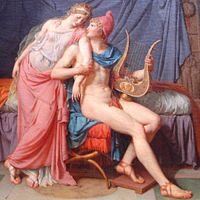
According to Homer, Odysseus is one of many powerful and influential suitors for Tyndareus' daughter Helen, considered the most beautiful woman in the world. Tyndareus fears the wrath of whomever he does not choose as Helen's husband. Odysseus promises to solve this dilemma in return for Tyndareus' support for Odysseus' suit for Penelope, daughter of Icarius, and second cousin to Helen. Odysseus proposes that Tyndareus require all the suitors to swear an oath to defend whomever Helen chooses as husband from among the oath-takers. The suitors, including Odysseus, swear, and Helen chooses Menelaus.
When Helen is abducted by Paris of Troy, Menelaus calls upon the other suitors to honor their oaths and help him retrieve her, thus bringing about the Trojan War. OdysseusÔÇöwho had been away from home a long timeÔÇötries to avoid the war by feigning madness, but Palamedes exposes the ruse. In a last ditch attempt to avert war, Odysseus accompanies Menelaus and Palamedes to Troy in an effort to negotiate Helen's peaceful return. Menelaus makes unpersuasive emotional arguments, but Odysseus' arguments very nearly persuade the Trojan court to hand Helen over.
The Trojan War
Odysseus serves also as one of the most influential Greek champions during the Trojan War. Along with Nestor and Idomeneus he is one of the most trusted advisers and counselors. He champions the Achaean cause and is unwavering when the king is in question. After many of the heroes have left the battlefield due to injuries Odysseus persuades Agamemnon not to withdraw. Along with two other envoys he is chosen to try to persuade the hero Achilles to return to combat, but does not succeed.
When Achilles is slain in battle, it is Odysseus and Telamonian Ajax who successfully retrieve the fallen warrior's body and armor in the thick of heavy fighting. During the funeral games for Achilles, Odysseus competes with Ajax to win Achilles' weapons and armor. The Greeks fear to decide a winner, for they do not want one of the heroes feeling insulted or abandoning the war effort. Nestor suggests that they allow the captive Trojans to decide the winner. Odysseus is declared the winner and the humiliated Ajax kills himself.
It is the clever Odysseus who then devised the famous stratagem of the Trojan Horse. Built by Epeius and filled with Greek warriors led by Odysseus it will prove the final stroke in the nine-year Trojan War.
Back to Ithaca
The Odyssey contains the epic and mythic story of Odysseus' ten-year voyage to reach Ithaca. After Odysseus and his men depart from Troy, their ships near land. Eurylochus convinces Odysseus to go ashore and loot the nearby city. The city is not at all protected, and all of the inhabitants flee without a fight into the nearby mountains. Odysseus and his men loot the city, and Odysseus wisely orders the men to board the ships quickly. They refuse, eat dinner, and fall asleep on the beach. The next morning, the Ciconians, allies of Troy and great warriors, return with their fierce kinsmen from the mountains. Odysseus and his men flee to the ships as fast as they can, but many men are left behind: "six benches were left empty in every ship" (The Odyssey, Book IX, line 64).
Odysseus and his men then land upon the island of the Lotus-Eaters. Odysseus sends out a small scouting party who eat the lotus with the natives. This causes them to fall asleep, awakening somewhat later, euphoric and intoxicated. Odysseus pursues the scouting party, drags them back to their ships against their will where they set sail again; the drugged men are tied to the benches to prevent them from swimming back to the island.
Land of the Cyclops
Later, a scouting party led by Odysseus and his friend Misenus, lands in the territory of the Cyclops, venturing upon a large cave. They proceed to feast on the livestock they find there. Unknown to them, the cave is the dwelling of Polyphemus, a giant Cyclops who soon returns. Polyphemus refuses hospitality to his uninvited guests and traps them in his cave, blocking the entrance with a boulder immovable by mortal men. He then proceeds to eat a pair of the men each day. Odysseus devises a cunning plan for escape.
To make Polyphemus unwary, Odysseus gives him a bowl of strong, unwatered wine that was given to them by Maron, the priest of Apollo. When Polyphemus asks for his name, Odysseus tells him that it is ╬č߯ö¤ä╬╣¤é (Outis, "Nobody," which is also a short form of his own name). In appreciation for the wine, Polyphemus offers to return the favor by eating him last. Once the giant falls asleep, Odysseus and his men use a pine treeÔÇöwhich they have fashioned into a giant spearÔÇöto blind Polyphemus. Hearing Polyphemus' cries, other Cyclops come to his cave, instinctively. Polyphemus replies "╬č߯ľ¤ä╬»¤é ╬╝╬Á ╬║¤ä╬Á╬»╬Ż╬Á╬╣ ╬┤¤î╬╗ß┐│ ╬┐߯É╬┤߯▓ ╬▓╬»╬̤ć╬╣╬Ż." ("Nobody is killing me either by treachery or brute violence!") The other Cyclops leave him alone, thinking that his outbursts must be madness or the gods' doing.
In the morning, Polyphemus rolls back the boulder to let the sheep out to graze. Polyphemus cannot see the men, but he feels the tops of his sheep to make sure that the men are not riding them, and spreads his arm at the entrance of the cave. Odysseus and his men escape, having tied themselves to the undersides of the sheep. Once Odysseus and his men are out, they load the sheep on board their ships and set sail.
As Odysseus and his men are sailing away, he reveals his true identity to Polyphemus. Enraged, Polyphemus tries to hit the ship with boulders, but because he is blind, he misses. When the ship appears to be getting away at last, Polyphemus raises his arms to his father, Poseidon, god of the sea. He asks him not to allow Odysseus to get back home to Ithaca, adding that if Odysseus does arrive home, he should do so alone, his crew either dead or aboard a stranger's ship.
A troubled crew
Odysseus next stops at Aeolia, home of Aeolus, the favored mortal who received from the gods the power of controlling the winds. Aeolus gives Odysseus and his crew hospitality for a month. Aeolus also provides a bag filled with all the winds except for the one that will lead him home. Odysseus' crew members suspect that there is treasure in the bag, and two of the men decide to open it as soon as Odysseus falls asleepÔÇöjust before their home is reached. Subsequently, they are blown away by a violent storm back to Aeolia by Poseidon, where Aeolus refuses to provide any more help, fearing that Odysseus is cursed by the gods. Once again, Odysseus has to start his journey from Aeolia to Ithaca.
Arriving at Telepylos, the stronghold of the Laestrygonians. When they arrive there they find a gigantic woman, the wife of an equally large Antiphates, king of the Laestrygonians, who promptly calls her husband. He immediately snatches up one of the men and starts to eat him. Two other men run away, but Antiphates raises such a commotion that they are pursued by thousands of Laestrygonians, all of whom are giants. They throw vast rocks from the cliffs, smashing the ships, and spear the men like fish. Odysseus makes his escape with his single ship not trapped in the harbor. The rest of his company is lost.
The island of Circe
The forlorn Odysseus and his surviving crew venture next to the island of Circe. Upon their arrival, Odysseus sends a scouting party ahead of the rest of the group. Circe invites them to a feast. However, the food is laced with one of her magical potions to make them sleep, and she then proceeds to change all the men into pigs with a wave of her magical wand. Only Eurylochus, suspecting treachery from the outset, escapes by hiding. He warns Odysseus and the others who had stayed behind at the ships.
Odysseus sets out to rescue his men, but is intercepted by Hermes who tells him to procure some of the herb molu first. When Circe's magic fails, somehow she falls in love with Odysseus. Her offer to share her bed with him, at first, goes unheeded. Odysseus declares that he will accept her offer only after she has turned his men back into their human form. Circe obliges, and they share her bed. Much later, after Odysseus and his men have gone, Circe bears him a son, Telegonus. It will be Telegonus who eventually brings about the death of Odysseus.
Odysseus desires to talk with Tiresias, blind prophet of Thebes]], who is already dead, so he and his men journey to the River Acheron in Hades, where they perform sacrifices which allow them to speak to the dead. Tiresias tells him how to pass by Helios' cattle and the whirlpool Charybdis, as well as other secrets of survival. Tiresias prophesies that, after many trials, he will die an old man, "full of years and peace of mind."
Odysseus also meets Achilles, who tells Odysseus that he would rather be a slave on earth than the king of the dead. Odysseus also meets Agamemnon and his own mother. The soul of Ajax, still resentful of Odysseus over the matter of Achilles' armor, refuses to speak, despite Odysseus' pleas of regret.
The Sirens
Circe had warned Odysseus of the dangers of the The Sirens, singing creatures of the sea who pulled men to their death. She had advised him to avoid hearing the song, but that if he really felt he had to hear it, then he should be tied to the mast. His men should have their ears stopped with beeswax and be ordered not to heed his screams. Odysseus, moved by curiosity, twists these words and tells the men that Circe had told him that he alone had to listen to the song. However, he obeys her instructions and listens to the song while he is tied to the mast, agonizing with desire to join them.
Scylla and Charybdis
Odysseus now faces the famous twin horrors of Scylla and Charybdis. He had been told by Tiresias that he would have a choice of two paths home. One was the Wandering Rocks, where either all make it through or all die, and which had been passed only by Jason with the help of Zeus. Odysseus chooses the second path. On one side is a powerful whirlpoolÔÇöthe mouth of huge she-monsterÔÇöcalled Charybdis, which will sink the ship. However, on the other side of the strait is a monster named Scylla, with six heads who will seize and eat six men.
The advice is to sail close to Scylla and to lose the six men but not to fight, lest he lose more men. However, Odysseus does not dare tell his crew of the terrible sacrifice, for fear of ending up in the whirlpool of Charybdis. Six men die, and Odysseus declares that the desperate cries of his wretched betrayed men as the worst thing he has ever known.
Finally, Odysseus and his surviving crew approach the island of Thrinacia, sacred to Helios, where he keeps sacred cattle. Odysseus had been warned by Tiresias and Circe not to touch these cattle. He tells his men that they will not be landing on the island. The men threaten mutiny, however, and Odysseus unwisely gives in. Captain and crew are trapped by adverse winds on the island and begin to get hungry. Odysseus ventures inland to pray for help, but falls asleep. In his absence the mutinous Eurylochus incites the men to kill and eat the cattle. The guardians of the island, Helios' daughters Lampetia and Phaethusa, tell their father. Helios complains to Zeus, threatening to take the sun down to Hades if justice is not done. Zeus destroys the ship with a thunderbolt and all the men die except for Odysseus.
Calypso
Odysseus is then swept past both Scylla and Charybdis, washing up finally on Calypso's island. The nymph makes him her lover for seven years, not allowing him to leave, promising immortality if he stays. Odysseus, conflicted, remains strongly attracted to her by night, yet weeps for home and his family by day. On behalf of Athena, Zeus at last intervenes and sends Hermes to order Calypso to let Odysseus go. Odysseus leaves on a small raft furnished with provisions, only to be hit by a storm launched by his old enemy Poseidon. He washes up on the island of Scheria and is found by Nausicaa, daughter of King Alcinous and Queen Arete of the Phaeacians, who entertain him well and escort him to Ithaca. While upon Scheria, the bard sings a song of the Trojan war. As Odysseus was at Troy and longs to return to his home, he weeps at the song. Alcinous, realizing this, decides to press Odysseus for his true identity.
It is here that we get the long story of Odysseus' trip from Troy to Scheria. After the recital, the Phaecians offer Odysseus passage home, with all of the hoardings he had obtained on the way and the gifts the Phaecians themselves had bestowed upon him (showing xenia, the idea of guest friendship). King Alcinous provides one fast Ph├Žacian, ship that soon carries Odysseus home to Ithaca. However, Poseidon is furious and intends to cast a ring of mountains around Scheria so they can never sail again. Zeus, however, manages to persuade Poseidon not to do this. Instead, he turns the ship which carries Odysseus home to stone. Ever determined, on a makeshift raft, Odysseus sets sail for Ithaca once more.
Home to Penelope
In Ithaca, Penelope is having difficulties. Her husband has been gone for 20 years, and she does not know for sure whether he is alive or dead. She is beset with numerous men who think that a (fairly) young widow and queen of a small but tidy kingdom is a great prize. They want her to declare Odysseus dead and to choose a new husband from among them. Meanwhile, these suitors hang around the palace, eat her food, drink her wine, and consort with several of her maidservants. Temporizing, she fends them off for years, utilizing stalling tactics that are gradually wearing thin. For quite some time, Penelope pretends to weave a burial shroud for La├źrtes, Odysseus' father, who lies gravely ill, (Odysseus' mother, Anticlea, has already died of grief) claiming that she will choose one suitor when the job is finished. Every day she weaves a length of shroud, and every night she unweaves the same length of shroud. Finally, one day, a maid of hers betrays this secret to the suitors and they demand that she finally choose one of them to be her new husband.
Odysseus arrives, at last, completely alone. Upon landing, he is disguised as an old man in rags by Athena. Odysseus is welcomed by his old swineherd, Eumaeus, who does not recognize him, but still treats him well. His faithful dog, Argos, is the first to recognize him. Aged and decrepit, the dog does its best to wag its tail, but Odysseus, not wanting to be found out, pays him no attention. The disconsolate dog dies. The first human to recognize him is his old wet nurse, Euryclea, who knows him well enough to see through the rags, recognizing him by an old scar on his leg received when hunting boar. His son, Telemachus, does not see through the disguise, but Odysseus reveals his identity to him.
Still in his disguise, Odysseus approaches Penelope and tells her that he has met Odysseus who has said that whoever can string Odysseus' bow and shoot an arrow through 12 axe-heads in a row will be able to marry Penelope. Penelope then announces what Odysseus has said. The suitors each try to string the bow, but in vain. Odysseus then takes the bow, strings it, lines up 12 axe-heads, and shoots an arrow through all 12. Athena then takes off his disguise. With the help of Telemachus, Athena, and Eumaeus the swineherd, Odysseus kills all of the suitors and their servants except Med├┤n, the herald, who had served the suitors due only to coercion, and Phemius, a bard who had also been pressured by the suitors to entertain them.
Penelope, still not quite sure that the stranger is indeed her husband, tests him. She orders her maid to make up Odysseus' bed and move it from their bedchamber into the main hall of the house. Odysseus is initially furious when he hears this because one of the bed posts is made from a living olive treeÔÇöhe himself had designed it this way and thus it could not be moved. He tells her this and since only Odysseus and Penelope know that for a fact, Penelope at last, embraces her husband, begging for forgiveness.
Later, one of the suitors' fathers, Eupeithes, tries to overthrow Odysseus. La├źrtes kills him, and Athena thereafter requires the suitors' families and Odysseus to make peace. This is where the story of the Odyssey ends.
Odysseus outside of Homer
Classical writings
Odysseus is one of the most recurrent characters in Western culture from classical to modern times.
The supposed last poem in the epic cycle is called the Telegony, and is thought to tell the story of Odysseus's last voyage, including his death at the hands of Telegonus, his son with Circe. However, the poem, like the others of the cycle, is "lost" in that no authentic version has been discovered.
In fifth century B.C.E. Athens, tales of the Trojan War were popular subjects for tragedies, and Odysseus figures centrally or indirectly in a number of the extant plays by Aeschylus, Sophocles, (Ajax, Philoctetes) and Euripides, (Hecuba, and Rhesus). He certainly figured in still more than have survived.
As Ulysses, he is mentioned regularly in Virgil's Aeneid. The poem's hero, Aeneas, rescues one of Ulysses' crew members who was left behind on the island of the Cyclops. He in turn offers a first-person account of some of the same events Homer relates, in which Ulysses appears directly. Virgil's Ulysses typifies his view of the Greeks: he is cunning but impious. Ultimately malicious and hedonistic and is constantly referred to as "Cruel Odysseus."
Ovid retells parts of Ulysses' journeys, focusing on his romantic involvements with Circe and Calypso, and recasts him as, in Harold Bloom's phrase, "one of the great wandering womanizers." Ovid also gives a detailed account of the contest between Ulysses and Ajax for the armor of Achilles.
Greek legend tells of Ulysses as the founder of Lisbon, Portugal, calling it Ulisipo or Ulisseya, during his 20-year errand on the Mediterranean and Atlantic seas. Olisipo was Lisbon's name in the Roman Empire. Basing in this folk etymology, the belief that Ulysses founded Lisbon is recounted by Strabo based on Asclepiades of Myrleia's words, by Pomponius Mela, by Gaius Julius Solinus (third century C.E.), and finally by Cam├Áes in his epic poem Lusiads.
Middle Ages and Renaissance Literature
Dante, in Canto 26 of the Inferno section of his Divine Comedy, encounters Odysseus ("Ulisse") near the very bottom of Hell, as punishment for his schemes and conspiracies that won the Trojan War. In a famous passage, Dante has Odysseus relate a different version of his final voyage and death from the one foreshadowed by Homer. He tells how he set out with his men for one final journey of exploration to sail beyond the Pillars of Hercules and into the western sea to find what adventures awaited them. After traveling west and south for five months, they saw in the distance a great mountain rising from the sea (this is Purgatory, in Dante's cosmology), before a storm sank them. (Dante did not have access to the original Greek texts of the Homeric epics, so his knowledge of their subject matter was based only on information from later sources, chiefly Virgil's Aeneid but also Ovid; hence the discrepancy between Dante and Homer.)
Odysseus also appears in Shakespeare's Troilus and Cressida, set during the Trojan War.
Modern Literature
Alfred, Lord Tennyson's Ulysses presents an aging king who has seen too much of the world to be happy sitting on a throne idling his days away. Leaving the task of civilizing his people to his son, he gathers together a band of old comrades "to sail beyond the sunset."
James Joyce's novel Ulysses uses modern literary devices to narrate a single day in the life of a Dublin businessman named Leopold Bloom; which turns out to bear many elaborate parallels to Odysseus' 20 years of wandering.
Frederick Rolfe's The Weird of the Wanderer has the hero Nicholas Crabbe (based on the author) traveling back in time, discovering that he is the reincarnation of Odysseus, marrying Helen, being deified and ending up as one of the three Magi.
Nikos Kazantzakis' The Odyssey: A Modern Sequel, a 33,333 line epic poem, begins with Odysseus cleansing his body of the blood of Penelope's suitors. Odysseus soon leaves Ithaca in search of new adventures. Before his death he abducts Helen; incites revolutions in Crete and Egypt; communes with God; and meets representatives of various famous historical and literary figures, such as Vladimir Lenin, Jesus and Don Quixote.
Film
Several films have been based on the story of Odysseus. Two recent examples are Brother Where Art Thou, and Cold Mountain.
Notes
ReferencesISBN links support NWE through referral fees
- Bittlestone, Robert with James Diggle, and Underhill, John. Odysseus Unbound: The Search for HomerÔÇÖs Ithaca. Cambridge University Press, 2005. ISBN 9780521853576
- Claybourne, Anna and Kamini Khanduri. Greek Myths: Ulysses and the Trojan War. Usborne Books, 2003. ISBN 9780794505356
- Liddell, Henry George, and Robert Scott, eds. 1940. ߯ł╬┤¤ů¤â¤â╬Á߯║¤é A Greek-English Lexicon. (original 1889) www.perseus.tufts.edu. Retrieved September 25, 2007.
- Tole, Vasil S. Odyssey and Sirens: A Temptation towards the Mystery of the Iso-polyphonic Regions of Epirus, A Homeric theme with variations. Tirana, Albania: 2005. ISBN 9994331639
External links
All links retrieved November 17, 2022.
- Odysseus and the Odyssey.
- Odysseus Encyclopedia Mythica.
Credits
New World Encyclopedia writers and editors rewrote and completed the Wikipedia article in accordance with New World Encyclopedia standards. This article abides by terms of the Creative Commons CC-by-sa 3.0 License (CC-by-sa), which may be used and disseminated with proper attribution. Credit is due under the terms of this license that can reference both the New World Encyclopedia contributors and the selfless volunteer contributors of the Wikimedia Foundation. To cite this article click here for a list of acceptable citing formats.The history of earlier contributions by wikipedians is accessible to researchers here:
The history of this article since it was imported to New World Encyclopedia:
Note: Some restrictions may apply to use of individual images which are separately licensed.
